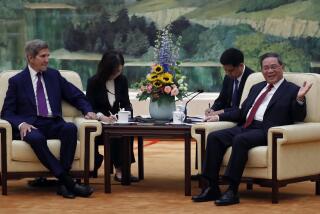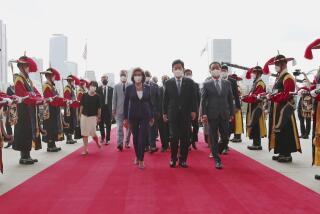Obama-Suu Kyi visit in Myanmar reflects warmth and differences
- Share via
Reporting from Yangon, Myanmar — They greeted each other with a hug and a kiss on the cheek, and then Friday’s meeting between President Obama and Myanmar pro-democracy icon Aung San Suu Kyi quickly moved beyond pleasantries.
He suggested she speak out more forcefully on behalf of her country’s persecuted minorities.
She cautioned him against accepting too rosy a picture of the progress the U.S. has helped bring to Myanmar, which is emerging from years of totalitarian rule.
After the hourlong meeting at Suu Kyi’s lakeside home, the two emerged arm in arm for a news conference on her back porch, acknowledging their differences as well as their devotion to democracy.
“I would like to make it quite clear,” Suu Kyi said, “we may view things differently from time to time, but it will in no way affect our friendship.”
Two years after their relationship began as admiration between two Nobel Peace Prize recipients, time and events have given it more texture and, Obama advisors say, more depth. Obama’s visit to Suu Kyi, the leader of Myanmar’s opposition movement, was part of his recommitment to helping make the country more democratic, a possibility that advisors say captivates him.
Obama told Suu Kyi in private that as an important voice on democratic principles, she could be a significant force in fighting for tolerance and an end to discrimination and persecution of minorities, according to a U.S. official familiar with the conversation.
Ruled for decades by the military, Myanmar, also known as Burma, has moved fitfully toward a democratic government in recent years. It’s been encouraged by the United States — Obama’s visit in 2012 was the first by a sitting American president, and Myanmar has received more than $225 million in U.S. aid since.
“Burma is inching forward on reforms, and Obama is following on his work to support them,” said Patrick Cronin, senior director of the Asia-Pacific Security Program at the Center for a New American Security. “He’s doing the right thing, and he probably wants to be able to take credit for this.”
As Obama seeks to support Myanmar’s evolution, advisors say, he is pursuing his own strategy of carrot-and-stick incentives with its officials. Visiting the country on a trip pegged to an economic summit, he met with President Thein Sein on Thursday, who pledged to address concerns.
In Myanmar, ethnic violence between the Buddhist majority and a Muslim minority known as the Rohingya continues to rage in Rakhine state. Thousands have been killed or detained, and the government has not prosecuted those responsible for what Human Rights Watch calls an “ethnic cleansing” two years ago.
Obama seeks out Suu Kyi’s judgment about whether the Myanmar government is making changes, aides say.
Suu Kyi, who was released from house arrest in 2010 after more than a decade as an internationally prominent political prisoner, has a way of holding “everybody’s feet to the fire,” said Ben Rhodes, Obama’s deputy national security advisor. “We need that heavy dose of skepticism.”
In 2012, Suu Kyi warned Obama that reform in Myanmar would not come easily.
“The most difficult time in any transition is when we think success is in sight,” she said then. “Then we have to be very careful that we are not lured by a mirage of success.”
Her words proved prescient. Though the quasi-military government released political prisoners and tapered off its censorship of journalists, a constitutional amendment that reserves a quarter of the seats in the parliament for members of the military remains unchanged. And Suu Kyi, a heroine in her country, can’t run for president because of a law forbidding election of anyone whose family members are foreign nationals. Her late husband was British, as are her children.
Though she was upbeat after winning her parliament seat in 2012, her doubts about the government’s commitment to reform have grown, and she has slowly ramped up her warnings to the U.S.
Suu Kyi this month told a group in Yangon that she thinks the reforms have ground to a halt and that people need to see Myanmar “for what it really is.”
When she and Obama talked with reporters Friday, she called for a “healthy balance between optimism and pessimism” and counseled against painting “too rosy a picture” of the progress.
Suu Kyi looked at Obama and smiled as he talked, especially as he fielded questions about domestic politics.
As they turned to walk back into her home, each walked with an arm around the other.
She expressed sympathy about “all the hard questions” that had followed him to her lakeside villa.
“It comes with the territory,” he told her, smiling.
For more White House coverage, follow @cparsons
More to Read
Sign up for Essential California
The most important California stories and recommendations in your inbox every morning.
You may occasionally receive promotional content from the Los Angeles Times.











